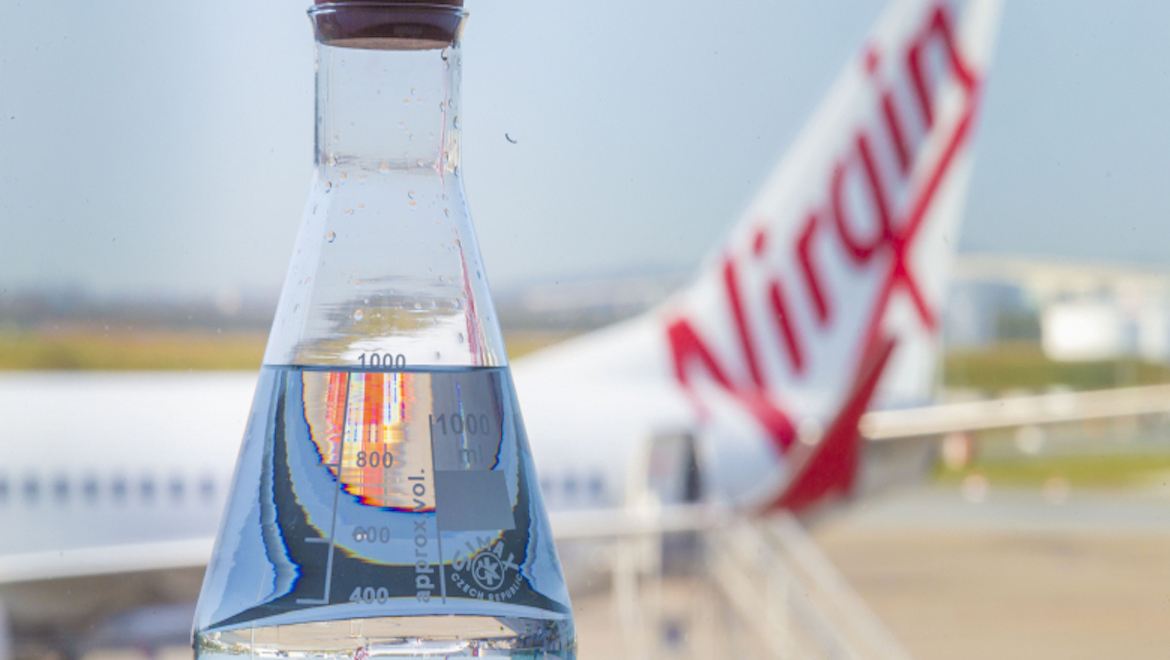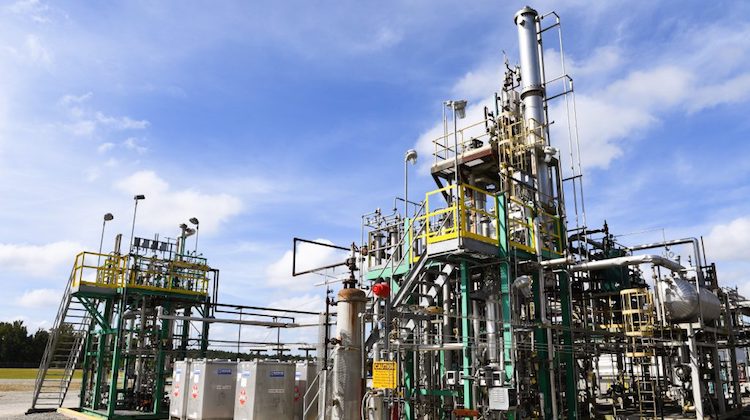
Virgin Australia’s push into sustainable aviation fuel, part of a strengthening trend in the global airline industry’s push toward cleaner energy use, has clocked up one million kilometres in less than a year.
The airline’s trial of low-carbon aviation fuel is being conducted in a partnership with the Queensland Government, Brisbane Airport Corporation, US-based biofuel producer Gevo, Inc., and supply chain partners Caltex and DB Schenker.
The joint effort was announced in October 2017 and Virgin Australia took its first delivery in August 2018. It has since used the fuel on more than 700 flights.
Sustainable jet fuels with lower greenhouse gas emissions over the production cycles are typically used in a blend with conventional jet fuel, which is the case in this trial.
Virgin Australia chief legal and risk officer Dayna Field said reaching one million kilometres was an “important milestone” and demonstrated the viability of the low-carbon fuel.
“We are actively looking at ways to reduce our carbon emissions and low-carbon fuels present a real opportunity. As a diversified airline group, we know that establishing a local low-carbon fuel industry will have positive environmental, social and economic impacts,” Field said in a statement on Monday.
Gevo chief executive Patrick Gruber, said reaching the one million kilometre mark was only the beginning for sustainable aviation fuel.
“We are pleased to be working with Virgin Australia to get our de-fossilised, sustainable jet fuel into the Australian air,” Gruber said.
Gevo’s process for its “alcohol-to-jet” fuel takes bio-mass – usually grains – as feedstock, which is then fractionated to produce protein and animal feed. A residual carbohydrate fraction is then put through a fermentation process to make isobutanol, which is then converted into low-sulfur, low-particulate jet fuel that Gevo said had a higher energy density than the conventional petroleum-based jet fuel.
The trial by Virgin Australia and its partners was in line with a rising trend across the global aviation industry.
Virgin Australia’s million-kilometre announcement came only three days after Japan’s All Nippon Airways (ANA) revealed it had signed an offtake agreement with international sustainable fuel producer LanzaTech, Inc.
ANA executive vice president Akihiko Miura said that adopting LanzaTech’s advanced fuel would allow the airline to cut CO2 emissions and meet its own sustainable development goals.
“ANA has always been guided by our values, and our decision to transition to sustainable aviation fuel reflects how seriously we take our commitment to the environment,” Miura said in a statement.
LanzaTech’s sulfur-free fuel was chosen for its flexibility and high energy density.
The fuel was created from ethanol produced from recycled waste gases from steel making and other heavy industrial processes, using microorganism-powered gas fermentation technology.
The product was blended 50 per cent with conventional jet fuel and would ease the transition to full sustainability, ANA said.
The LanzaTech fuel was first used on a commercial flight in October 2018, in a Virgin Atlantic Boeing 747 flight from Orlando to London Gatwick.
In other recent moves towards sustainability, a group of aviation businesses combined to turn a routine weekday service, between Halmstad City Airport and Stockholm Bromma Airport, into a showcase for sustainability.
The service uses fuel produced from sustainable and renewable raw materials, supplied by Air BP and produced by Finish refiner Neste.

Also in May, KLM announced an agreement to buy 75,000 tonnes of aviation fuel a year from Europe’s first dedicated production plant for sustainable biofuel.
SUSTAINABILITY A MAJOR FOCUS IN AVIATION
Aviation currently represented about two per cent of man-made carbon dioxide emissions.
In October 2016, an overwhelming majority of the International Civil Aviation Organisation’s 191 member states agreed to the Carbon Offsetting and Reduction Scheme for International Aviation (CORSIA).
Further, 73 nations, including Australia, New Zealand and Papua New Guinea in this part of the world, have agreed to be part of CORSIA from the start.
The landmark agreement has among its targets for the industry to achieve carbon neutral growth by 2020, in addition to a 50 per cent reduction in CO2 emissions by 2050, compared with 2005 levels.
ICAO has also come up with a CO2 emissions standard, where aircraft will have to meet a maximum fuel burn per flight kilometre baseline which must not be exceeded. The standard would apply to new aircraft designs from 2020, while new deliveries of current in-production aircraft models would be subject to the CO2 standard from 2023.
Further, the ICAO measure also recommended a cut-off date of 2028 for production aircraft that did not comply with the standard.
Annual reporting by airlines of emissions on international flights began on January 1 2019.
Moreover, the International Air Transport Association (IATA) has set a target of an average improvement in fuel efficiency of 1.5 per cent per year from 2009 to 2020, as well as aspirations to build an aircraft that produced no emissions within 50 years.
Figures from IATA presented at its recent annual general meeting in Seoul showed CORSIA was forecast to mitigate about 2.5 billion tonnes of CO2 between 2021 and 2035. The figure represented an annual average of 164 million tonnes of CO2.
Further, CORSIA was also expected to generate investment in climate projects of at least USD40 billion.
















Michael Eggleston
says:I am pleased to read that Gevo chief executive Patrick Gruber is using the term “defossilization” rather than “decarbonization” to describe their work with Virgin Australia. Since carbon is the feedstock for a bio-economy, then discussions on how this carbon should be handled must also remain at the forefront of developing proper legislation. Regarding biofuels, the breaking and forming of carbon bonds into released and stored energy implies carbon to be at the center of attention. This means that consideration needs to be made regarding how atmospheric carbon is managed if both anthropogenic climate change and feedstock supply for a bio-economy are to be addressed. If a bio-based economy is going to make any significant impact in those regards, the correct terminology must be used if we are to be effective with our current actions. To understand more about the difference between these two words please visit: https://advancedbiofuelsusa.info/drills-and-pipelines-may-pollute-our-climate-but-words-will-break-or-make-us/